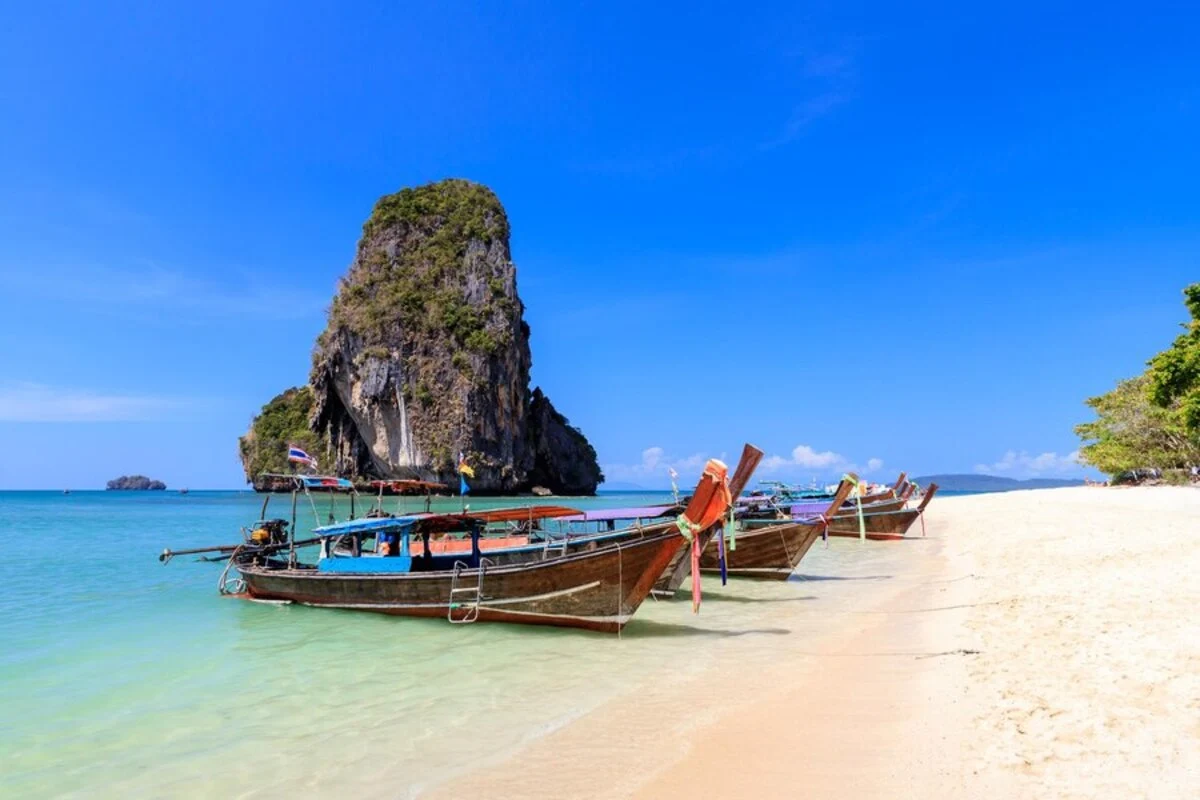How to work and travel in Thailand

Are you one of those people who want to enjoy staying in the charm of Thailand, but you’re on a budget? If yes, here’s what you need to know. Thailand is a fantastic destination for travellers who want to dive into both work and adventure. Whether you’re interested in volunteering or teaching English, there are plenty of opportunities to make a meaningful impact while exploring this beautiful country. Thailand doesn’t offer the exact work and travel programmes but hold on, you can go through this guide to learn how you can work and travel together in Thailand. Take your chance for a great way to gain experience and broaden your horizons.
What you need to know when working and travelling in Thailand

When you’re thinking about a work and travel program in Thailand, there are several key factors you need to keep in mind:
- Visa requirements: Most foreigners will need a Non-Immigrant B Visa and a work permit to work legally in Thailand. Make sure you have all the necessary documentation sorted out before starting any job.
- Cultural sensitivity: Take some time to learn about Thai customs and etiquette. Understanding local norms—like showing respect for elders, dressing modestly, and being mindful in social interactions—can help you avoid any unintentional offence.
- Climate adaptation: Thailand has a tropical climate that can be quite challenging, especially for newcomers. Be ready for high humidity and temperatures, particularly if your work involves outdoor activities.
- Health precautions: It’s wise to get recommended vaccinations and have health insurance. Be aware of potential health risks like dengue fever and food-borne illnesses.
- Language barriers: While English is commonly spoken in tourist areas, learning a few basic Thai phrases can really enhance your experience and improve your job prospects.
- Cost of living: Research the living expenses in your chosen location, as costs can vary widely between urban centres and rural areas.
- Work conditions: Familiarise yourself with your rights as a foreign worker and be cautious of potential exploitation, especially in informal job arrangements.
By considering these factors, you’ll be better prepared for a successful and fulfilling work and travel experience in Thailand!
Work requirement
If you’re considering working and travelling in Thailand, it’s essential to plan ahead and understand the visa requirements. Here’s what you need to know:
- Tourist visas won’t allow you to work legally, so be sure to choose the right visa from the start.
- To get a work permit, you’ll usually need a job offer from a Thai company.
- Teaching English is a popular choice for many foreigners, but you typically need a bachelor’s degree and a TEFL certification to get started.
- If you’re a digital nomad, working remotely on a tourist visa is a bit of a grey area legally, so tread carefully.
- For volunteer work, you’ll need a Non-Immigrant O Visa and permission from the Thai government.
Here are some steps to help you make the move:
- Secure a job offer before you arrive in Thailand.
- Apply for a Non-Immigrant B Visa at a Thai embassy or consulate in your home country.
- Once in Thailand, apply for your work permit through your employer.
- Finally, make sure to register for a long-term visa at the immigration office within 90 days of your arrival.
With the right preparations, you can enjoy all that Thailand has to offer while working in a vibrant and dynamic environment!
Thailand work visa
Thailand doesn’t offer a specific “work and travel” visa programme like some other countries do, but you can work and enjoy travelling at the same time when you apply for the right visa. So, if you want to work legally there, you’ll typically need a Non-Immigrant B Visa and a work permit. Here are some key points to keep in mind:
- You’ll need to get your Non-Immigrant B Visa before entering Thailand, which you can typically obtain from a Thai embassy or consulate in your home country.
- Your work permit will specify your job and employer, meaning you can only work in the role outlined in the permit.
- Some nationalities might qualify for a visa exemption for short stays, but this does not permit any employment.
It’s really important to follow all legal requirements to avoid any issues, including penalties or deportation. For the most current visa information, always check with the Thai embassy or consulate, as regulations can change. With the right preparation, you can enjoy a fulfilling experience in Thailand.
Volunteer work visas
If you’re looking to volunteer in Thailand for your work and travel journey, you’ll need to apply for a Non-Immigrant O Visa specifically for volunteer work. This visa typically allows for an initial stay of 90 days, but you can extend it for up to a year based on the length of your volunteer project. Here are the main requirements:
- Your passport should be valid for at least 6 months.
- You’ll need an invitation letter from a registered Thai organisation.
- A completed visa application form is essential.
- Don’t forget recent passport-sized photos.
- You’ll also need copies of the organisation’s registration documents.
- Lastly, a work contract or project description is required.
Once you arrive in Thailand, you’ll need to obtain a work permit from the Thai Labor Department. Keep in mind that some nationalities might have extra requirements or restrictions, so it’s a good idea to check in with the Thai embassy in your home country for the most accurate information. With the right preparations, you’ll be all set to make a positive impact while enjoying your time in Thailand.
Available jobs
Thailand offers a wide range of job opportunities for foreigners looking to gain experience while exploring the country. Here are some common positions you might find when you want to enjoy working while travelling at the same time:
- Hotel and resort staff, including roles like front desk agents, housekeepers, or waitstaff.
- Tour guides or travel consultants for local tourism companies, sharing your knowledge with visitors.
- English language teachers or tutors, especially in language schools or summer camps.
- Hospitality roles in restaurants, cafes, or bars, are perfect for those who enjoy a lively atmosphere.
- Retail positions in popular tourist areas or shopping centres, where you can interact with travellers.
- Administrative or customer service roles in international companies, often seeking English-speaking staff.
These jobs are generally tailored for English-speaking travellers and usually don’t require extensive experience, though some may prefer candidates with specific skills or certifications, like TEFL for teaching English. Keep in mind that the availability of work opportunities can vary depending on the season and location, with more options in popular tourist spots during peak travel times. This can be a great way to earn some income while soaking up the vibrant culture of Thailand!
Top city to balance work and travel

Thailand has some amazing spots for anyone wanting to blend work and travel. Here are a few top choices:
- Chiang Mai: Often called the digital nomad capital, Chiang Mai is a favourite for its affordable living, a wealth of coworking spaces, and friendly expat community. It’s perfect for those who want a laid-back lifestyle while staying productive.
- Koh Phangan: Known for its stunning beaches and chill vibe, Koh Phangan is becoming increasingly popular among remote workers. With a growing number of coworking spaces, it’s an ideal place to work while enjoying island life.
- Bangkok: As the bustling capital, Bangkok offers a vibrant urban experience. You’ll find excellent infrastructure, plenty of job opportunities, and easy access to other parts of the country, making it a great base for work and exploration.
- Phuket: This well-known island strikes a lovely balance between work and leisure. With beachfront coworking spaces and a large expat community, it’s perfect for those who want to enjoy the sun while getting things done.
- Koh Samui: Another beautiful island, Koh Samui boasts a strong expat presence, affordable living, and various coworking options. It’s a fantastic choice if you’re looking for a mix of work and tropical relaxation.
Each of these locations offers a unique vibe, catering to different tastes while providing essential facilities like reliable internet and coworking spaces. Whether you prefer the mountains, city life, or beach relaxation, you’ll find the perfect spot to thrive while you work and explore!
Alright, It’s time for you to grab a chance to explore this vibrant country while getting an opportunity to work at the same time. Be ready to enjoy life in Thailand with the right preparation, visas, available jobs, cost of living, etc. Make sure to secure your work permit with Thai law to make sure you have a smooth journey in this land of smiles.
Latest Thailand News
Follow The Thaiger on Google News:


























